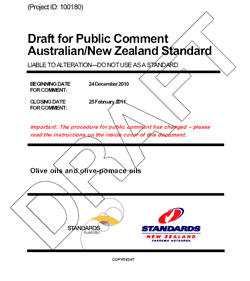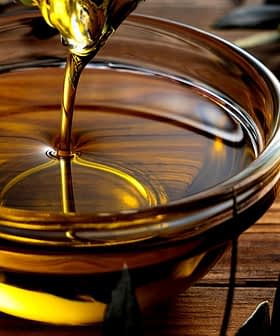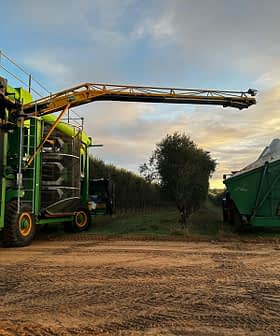By Sarah Schwager
Olive Oil Times Contributor | Reporting from Buenos Aires
Earlier this month, details of a draft were released of the first standard to address olive oil and olive-pomace oil in Australia and New Zealand. Drafting leader Leandro Ravetti told Olive Oil Times what he thinks it all means for olive oil producers, importers and consumers.
The proposed standards for Australia and New Zealand were expected to shake up the world’s olive oil industry by being the first to properly address mislabeling issues and the quality of extra virgin olive oil.
Consumers are currently misled by false and confusing labeling practices.
“Unscrupulous operators who are currently profiting from the significant price difference available by deceptively re-selling seed oils and/or inferior quality olive oil as high-value extra virgin olive oil will be seriously affected by this new regulation,” Leandro Ravetti said. “Meanwhile, genuine and honest operators from Australia, New Zealand and overseas will receive the advantage of a level playing field where their higher quality products are protected and recognized.”
While there has been much scandal recently in Australia about the quality of local versus imported olive oils sold in supermarkets, Mr. Ravetti said he prefers to talk about honest and high quality producers or unscrupulous operators regardless of where they are located. “There is significant Australian and overseas evidence indicating that large percentages of olive oils worldwide are mislabeled, adulterated with other seed oils or have been bottled using inferior oil,” he said.

Born and bred in Argentina and considered one of its top olive researchers, the agricultural engineer who moved to Australia in 2001 to join Boundary Bend as its technical director is now regarded among Australia’s most qualified and experienced advisors.
A member of the Standards Australia Technical Committee FT-034 Olive Oil representing Australian olive growers, Ravetti was in charge of writing the Standard, following directions received from a technical committee of varying representatives throughout the industry, and collating and resolving their comments and observations.
Mr. Ravetti said while the draft Australian and New Zealand standard and international standards (such as the Codex Standard for Olive Oils and Olive-Pomace Oils, the International Olive Council Trade Standard on Olive Oils and Olive-Pomace Oils, the European Commission Regulation on the characteristics of olive oil and olive-residue oil, and the US Standards for Grades of Olive Oil and Olive-Pomace Oil) have a number of areas in common, particularly regarding worldwide recognized analytical methodologies and critical limits, the new proposed standard significantly differs in a number of aspects.
These include a simpler and clearer commercial denomination of the different categories of olive oils and olive-pomace oils “in order to avoid the current misleading and confusing terms”; a review of the range limits for a number of chemical parameters in order to avoid genuine olive oil (particularly Australian and New Zealand olive oil) being excluded for its natural variation in composition; the introduction of recently developed analytical methods which are capable of detecting modern refining techniques not currently detectable by the older methodologies included in the existing standards; and the introduction of a best before date policy which is currently “missing in all other standards”.
Mr. Ravetti said none of the international standards accommodate the natural variation of the oils produced in Australia and New Zealand.
“Australia, through the Department of Agriculture, Fisheries and Forestry and with representation from the Australian olive industry, has made several attempts to introduce some of the proposed changes to olive oil standards in the Codex Alimentarius Commission Committee on Fats and Oils,” he said. “At each stage there has been opposition from other countries, particularly the European Union, but in my view without solid scientific or technical grounds for such opposition.”
Mr. Ravetti said the main reasons why Australia and New Zealand are now pursuing a “technically sound and consumer-oriented set of standards” for olive oil is to address the fact that consumers are currently misled by false and/or confusing labeling practices, which may result in the unknowing purchase of products of inferior quality and/or lower health attributes.
“Many high quality Australian and New Zealand oils are not recognized internationally, with arbitrary standards being utilized as trading barriers against natural variations in minor components that have no relevance to the actual quality of the oils,” he said.
Mr. Ravetti believes the main features of the draft standard are its strong focus on protecting consumers and its emphasis on EVOO as the highest quality grade. The standard proposes new grade denominations which he said are easier to understand.
“For example, the new document proposes to call a blend of refined olive oil and other olive oils ‘Refined Olive Oil Blend’ instead of confusing terms currently used such as ‘Extra light’ or ‘Pure Olive Oil’.”
It also incorporates new analytical techniques and a best before date policy aimed at protecting and encouraging the freshness of EVOO as well as detecting fraudulent practices.
Regarding the decision to set the level of free acidity in EVOO at 0.8 in line with the international standards, Mr. Ravetti said while he is not in a position to be able to publicly discuss any aspects that have been debated within the Technical Committee, personally he is in favor of the idea of lower free acidity levels for EVOO.
“But we must remember that the proposed document is the result of consensus reached amongst a large number of stakeholders,” he said. “It seems clear throughout the new document that all changes in comparison with international legislations were introduced only when absolutely necessary and very well supported by technical evidence.”
He said it is important to highlight that some of the new chemistry, such as the diacylglycerols (DAGs) analysis, would limit the presence of oils with high free acidities that they may fail this test during the shelf life of the product.
Mr. Ravetti said it is also important to note that the standard will be a voluntary document and will only have legal force if called up by regulators or in contracts.
* The opinions expressed in this article are Mr. Ravetti’s personal opinions and do not necessarily represent the views of Standards Australia or the Technical Committee on the draft standards.








